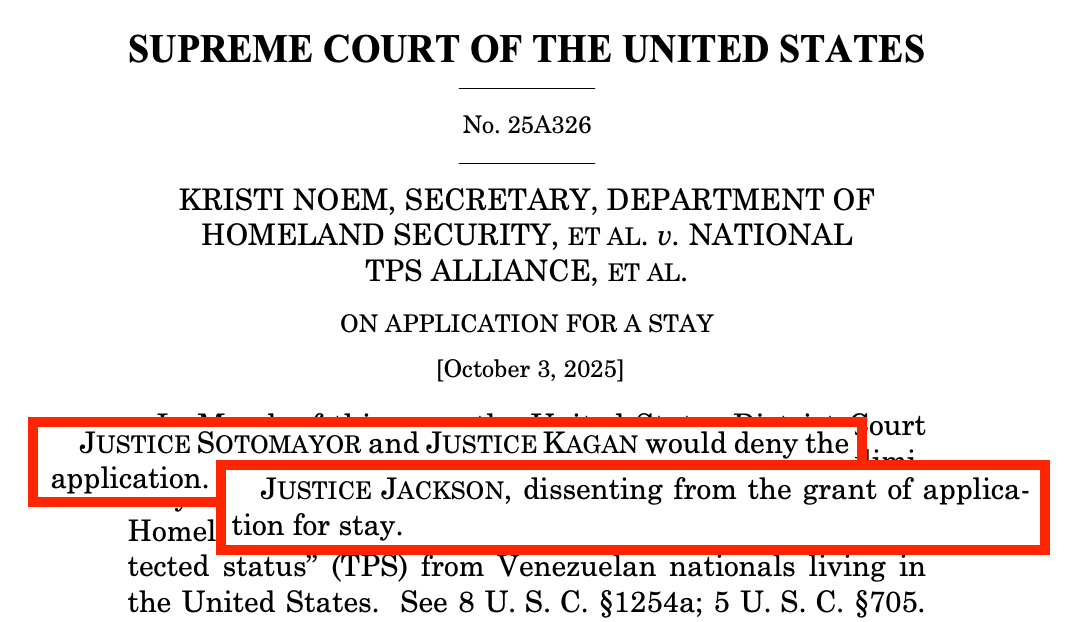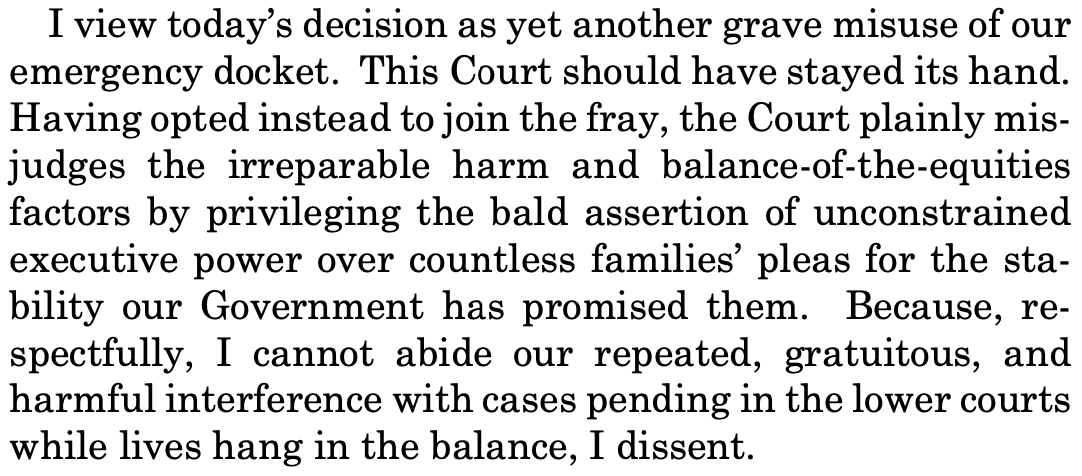Supreme Court lets Noem end legal status for many Venezuelans in the U.S.
The majority gave virtually no reasoning. The Democratic appointees objected, but only Justice Jackson wrote: "[Y]et another grave misuse of our emergency docket."
On Friday, the U.S. Supreme Court again rejected lower court efforts to stop Homeland Security Secretary Kristi Noem from ending immigration protections for more than 600,000 people in America from Venezuela — 300,000 of them now.
The decision was issued in a brief, unsigned order that contained virtually no reasoning. It was accompanied by no signed opinions from any of the justices in the majority and over opposition from the three Democratic appointees to the high court. Only Justice Ketanji Brown Jackson, however, wrote anything.
Calling the order “yet another grave misuse of our emergency docket,“ Jackson wrote that the majority had failed by “privileging the bald assertion of unconstrained executive power over countless families’ pleas for the stability our Government has promised them.“
That aggrandizement of executive power — to the detriment of individuals, the states, and the other branches — is in fitting with the pattern established by and increasingly advanced by the Roberts Court.
Friday’s order stayed the decision and partial judgment issued by U.S. District Judge Edward Chen in early September setting aside Noem’s action to end temporary protected status (TPS) for the Venezuelans in question.
It was the second time one of his decisions in the case — both times against Noem — reached the Supreme Court’s shadow docket. The first time, in May, the court blocked the portion of his preliminary ruling against Noem’s action but highlighted that certain related challenges remained available. Only Jackson noted her disagreement with that decision, and no justice wrote.
That May order from the Supreme Court contained absolutely no reasoning. By Friday, however, that order had manifested some meaning apparent only to Republican appointees of the Supreme Court.
“Although the posture of the case has changed, the parties’ legal arguments and relative harms generally have not,” the unsigned order issued by the Supreme Court on Friday stated. “The same result that we reached in May is appropriate here.”
This is not law. It is a spell, announced by a phantom. It is an empty decision, but coming as it does on behalf of a majority of the Supreme Court, it will have unfathomably cruel effects as it stands up Noem’s actions.
Look at what Chen wrote just last month about those actions.
“Secretary Noem’s generalization of the alleged [criminal] acts of a few (for which there is little or no evidence) to the entire population of Venezuelan TPS holders who have lower rates of criminality and higher rates of college education and workforce participation than the general population is a classic form of racism,“ he noted at one point in his ruling.
The lack of reasoning from the Supreme Court is truly appalling once you dig into the careful opinions from multiple courts addressing Noem’s action to vacate TPS with no care — a “fait accompli,” as Chen put it.1
“[T]here is no evidence of any reasoned decision making behind Secretary Noem’s vacatur,” Chen wrote. After detailing the process — or lack thereof — involved and the “unprecedented” lack of coordination involved, Chen concluded, “As a matter of law, the Secretary lacked the implicit authority to vacate. Even if she had such authority, there is no genuine dispute that she exceeded that authority. Furthermore, even if the Secretary had the authority to vacate, there is no genuine dispute that her decision to vacate was arbitrary and capricious for several reasons as set forth above.“
In affirming Chen’s initial decision in an August opinion, a three-judge panel of the U.S. Court of Appeals for the Ninth Circuit wrote of Noem’s actions: “The stability of TPS has been replaced by fears of family separation, detention, and deportation.“
Explaining the stay request before the Supreme Court over Chen’s September ruling, Jackson echoed that concern, “What should happen to 300,000 human beings while our colleagues on the Ninth Circuit, and then perhaps we, do the job of judging?“
Noting the district court and Ninth Circuit’s decisions denying a request for a stay of Chen’s September decision pending appeal, Jackson continued, “Our lower court colleagues have already chosen the obvious—i.e., least disruptive and most humane—answer to that question.“
On Friday, the Supreme Court’s right-wing majority chose otherwise.
In all, then, the Supreme Court’s majority has — in a total of five paragraphs over two orders — allowed Noem’s effort to proceed in opposition to seven rulings from seven judges, amounting to 227 pages of opinions.
No, numbers and pages aren’t ultimately what matters. But, the Supreme Court’s cavalier resolution of such requests despite their stark effects shows a disregard and disrespect for litigants before the court, for their lawyers, and for the lower federal courts that are actually showing their work.
Jackson did not hide her thoughts on that front, criticizing the court’s decision to “wordlessly override the considered judgments of our colleagues.” Pointedly, she added, “We once again use our equitable power (but not our opinion-writing capacity) to allow this Administration to disrupt as many lives as possible, as quickly as possible.”
It is true. Allowing the administration to “disrupt as many lives as possible, as quickly as possible“ has been a hallmark of the shadow docket this summer.
As Jackson concluded:
Jackson’s statement — that she “cannot abide our repeated, gratuitous, and harmful interference with cases pending in the lower courts while lives hang in the balance” — would be striking at any time.
It is all the more striking coming as it did on the Friday afternoon before the justices are set to return to the Supreme Court’s building on Monday, enter the courtroom, and start a new term.
As they do so, the marshal of the Supreme Court will announce that the court is sitting, before declaring, “God save the United States and this Honorable Court!“
“Vacatur (and termination) was a fait accompli from the outset,“ Chen concluded.





The Roberts Court is a blight on this country. If our democracy survives this administration intact it will be remembered as the stain that it is.
The Roberts Court has destroyed any credibility it had! This is a stupid, obnoxious ruling, on a par with Kavanaugh's bizarre ruling that abandoned the Fourth Amendment. Many of these Venezuelans have been pursuing citizenship and will be forced to return to a terrifying country before they can complete the citizenship process. This is yet another blight on the USA.